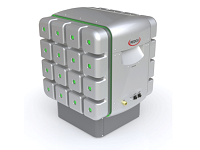Low-Temperature Solid Oxide Fuel Cells

Technology Description:
Redox Power Systems is developing a fuel cell with a mid-temperature operating target of 400°C while maintaining high power density and enabling faster cycling. Current fuel cell systems are expensive and bulky, which limits their commercialization and widespread adoption for distributed generation and other applications. Such state-of-the-art systems consist of fuel cells that either use a mixture of ceramic oxide materials that require high temperatures (~800°C) for grid-scale applications or are polymer-based technology with prohibitive low temperature operation for vehicle technologies. By combining advanced materials that have traditionally been unstable alone, Redox will create a new two-layer electrolyte configuration incorporating nano-enabled electrodes and stable ceramic anodes. The use of these materials will increase system power density and will have a startup time of less than 10 minutes, making them more responsive to demand. Redox is also developing a new fuel processor system optimized to work with their low-temperature solid oxide fuel cells. This new material configuration also allows the operating temperature to be reduced when incorporated into commercially fabricated fuel cells. These advances will enable Redox to produce a lower cost distributed generation product, as well as to enter new markets such as embedded power for datacenters.
Potential Impact:
If successful, Redox’s low temperature fuel cells will integrate a new two-layer electrolyte configuration that will reduce cost and increase lifetime and reliability.
Security:
Enabling more efficient use of natural gas for power generation provides a reliable alternative to other fuel sources—a broader fuel portfolio means more energy security.
Environment:
Natural gas produces roughly half the carbon dioxide emissions of coal, making it an environmentally friendly alternative to existing sources of power generation.
Economy:
Distributed generation technologies would reduce costs associated with power losses compared to centralized power stations and provide lower operating costs due to peak shaving.
Contact
ARPA-E Program Director:
Dr. David Tew
Project Contact:
Dr. Bryan Blackburn
Press and General Inquiries Email:
ARPA-E-Comms@hq.doe.gov
Project Contact Email:
bryan@redoxpowersystems.com
Partners
Trans-Tech, Inc.
University of Maryland
Related Projects
Release Date:
11/25/2013
